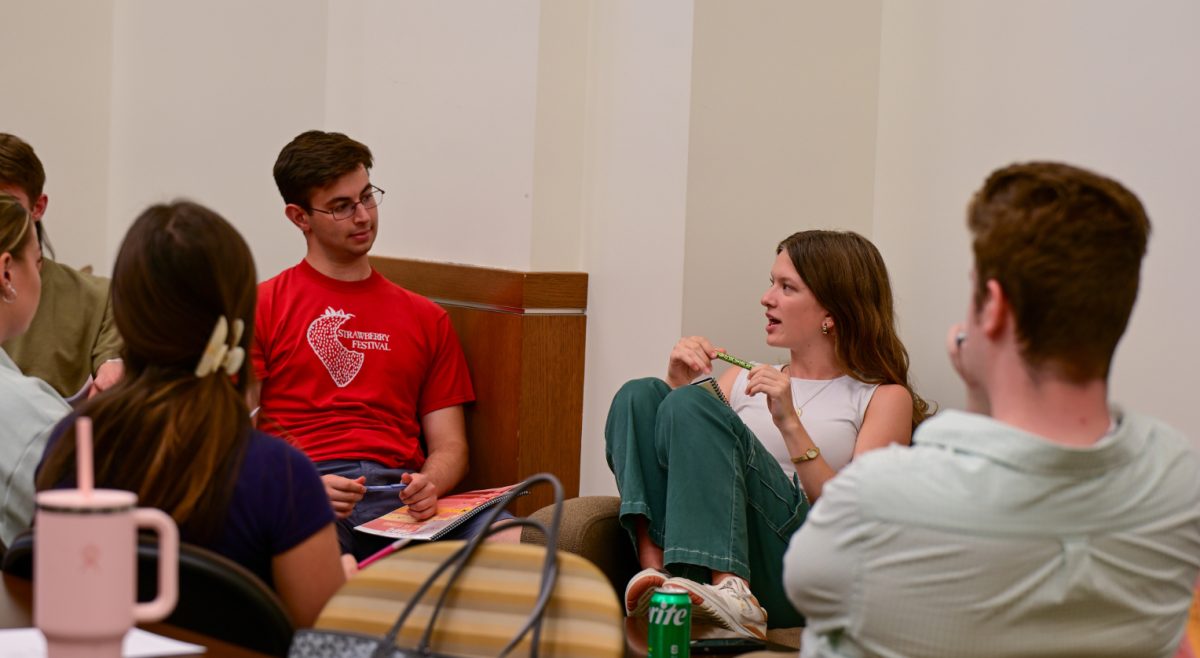
(Ellie El-Fishawy / Heights Staff)
Carl “Quinten” Dragstedt and Griffin Weiss, both MCAS ’28, encouraged the UGBC Senate in a public comment Tuesday night to release a statement condemning the presence of Immigration and Customs Enforcement (ICE) near campus and expressing solidarity with students.
“This is one of, if not the most, pressing matters facing our community right now,” Dragstedt said. “It is vital that UGBC stands in solidarity with its average students for their own safety and for the preservation of free speech on BC’s campus.”
Dragstedt emphasized to student senators that, as elected representatives, they should advocate for students at risk of detention by ICE.
“Given our current political context and the unique challenges that face many of the very people in our community, a statement released by UGBC is not only morally expected, but also practically necessary to show those at-risk students that there are institutions and structures of support in place for them,” Dragstedt told The Heights.
According to Dragstedt, UGBC’s silence leads the BC community to believe that the University is complicit in the potential detention of students.
“BC is the exception,” Weiss said. “Campuses in and around Boston have made statements pertaining to this. There are examples that we should follow, and I do think there is genuine, material harm done if there is no statement.”
Makayla Boxell, student senator and MCAS ’28, agreed that UGBC has a responsibility to stand with the students it represents and voiced support for Dragstedt’s suggestion.
“I feel like it’s on us to make any kind of statement,” Boxell said. “I think just being silent is the wrong way to go here, and the student body needs more from us.”
Boxell said that while the Office of Global Engagement’s (OGE) global engagement gateway—a resource UGBC highlighted last week—is a relevant and important resource for students, issuing a statement should also be a priority.
Will Cortes, student senator and MCAS ’28, agreed with Boxell, noting that while a statement is important, it should come after the Senate shares resources with students.
Cortes added that the Senate is working to distribute graphics and cards with resources about students’ rights during interactions with ICE to students, both on social media and at tabling events.
“Once we have this post up, and once we have those cards we can start handing out at all these tabling events, we’ll start to be able to reach students,” Cortes said. “Then, we can also look into things like that resolution to show our solidarity with the student body.”
Addie Weiss, student life committee chair and MCAS ’27, said disseminating resources before issuing a statement or passing a resolution demonstrates UGBC’s commitment to taking action.
“While I can recognize the importance of a statement for solidarity—and I do think it’s important that the students affected by this feel seen and heard and recognized—ultimately, a statement with no resources backing it is an empty statement,” Weiss said.
Weiss also clarified that the students who are most affected by ICE’s presence near campus are already being provided with resources by the University.
“I completely understand the need for transparency and a public approach to these issues, but there are obviously people who are personally affected by these sorts of incidents and issues on campus,” Weiss said. “The school is very aware of those people and maintains contact and updates and resources with those particular students.”